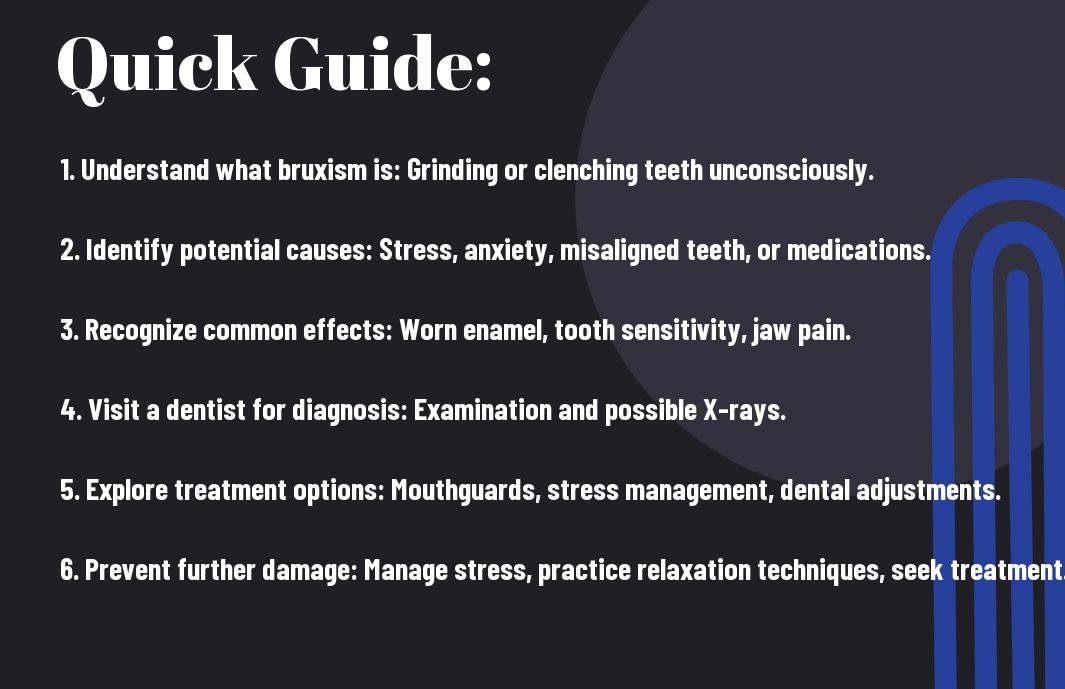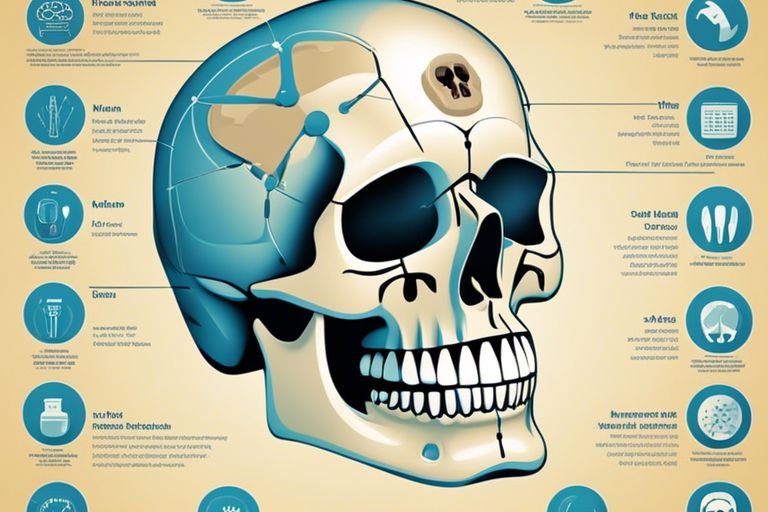Bruxism, the medical term for grinding your teeth, is a commonly misunderstood condition that can have serious consequences on your dental and overall health. I have researched and experienced the causes and effects of bruxism firsthand, and I want to share my knowledge with you. From the damage it causes to your teeth and jaw to the potential for chronic headaches and disrupted sleep, bruxism can have a significant impact on your quality of life. In this guide, I will delve into the causes of bruxism, the effects it can have on your dental health, and what steps you can take to address this potentially harmful condition. Whether you grind your teeth occasionally or on a regular basis, it’s important to understand the risks and potential solutions for this often overlooked issue.
Key Takeaways:
- Bruxism can be damaging: Grinding your teeth can lead to numerous dental issues, including worn enamel, tooth sensitivity, and cracked or broken teeth.
- Stress and anxiety are common triggers: Bruxism is often linked to stress and anxiety, so finding healthy ways to manage these emotions can help reduce teeth grinding.
- Night guards can provide relief: Wearing a night guard can help protect your teeth from the damaging effects of bruxism and alleviate symptoms such as jaw pain and headaches.
- Addressing underlying causes is crucial: Treating underlying issues such as sleep apnea or misaligned bite can help reduce bruxism and prevent further damage to your teeth.
- Regular dental check-ups are essential: Visiting your dentist regularly can help identify and address any signs of bruxism before they lead to more serious dental problems.
Types of Bruxism
For those who are unfamiliar with bruxism, it may come as a surprise to learn that there are actually two distinct types of this condition. The first type is awake bruxism, which involves the grinding or clenching of teeth during waking hours. The second type is sleep bruxism, which occurs during sleep and is often more difficult to detect without professional intervention.
| Awake Bruxism | Sleep Bruxism |
| Occurs during waking hours | Occurs during sleep |
| Linked to stress and anxiety | May be associated with sleep disorders |
| Can be consciously controlled | Often goes unrecognized by the individual |
| Can cause headaches and jaw pain | May lead to worn or damaged teeth |
Awake Bruxism
Awake bruxism is the type of teeth grinding or clenching that occurs during waking hours. This type of bruxism is often linked to stress and anxiety, and may be a result of an individual’s unconscious attempt to cope with these emotions. Perhaps the most concerning aspect of awake bruxism is that it can be consciously controlled. This means that individuals who are unaware of their condition may inadvertently exacerbate their symptoms by failing to address the underlying causes of their stress or anxiety. Knowing how to recognize the signs of awake bruxism is crucial in mitigating its effects and preventing long-term damage to the teeth and jaw.
Sleep Bruxism
Sleep bruxism, on the other hand, presents its own set of challenges. This type of bruxism occurs during sleep, often going unrecognized by the individual until the symptoms become more severe. Sleep bruxism may be associated with sleep disorders and can result in worn or damaged teeth, as well as jaw pain and headaches upon awakening. It is important to seek professional guidance if you suspect that you may be experiencing sleep bruxism, as early intervention can help prevent further complications.
Tips for Managing Bruxism
Obviously, the best way to manage bruxism is to address the underlying causes and factors that contribute to teeth grinding. While it may not be possible to completely eliminate the problem, there are several strategies to help reduce its impact and minimize its effects on your teeth and overall health.
- Stress management: Find healthy ways to manage and reduce stress, such as exercise, meditation, and relaxation techniques.
- Medication: In some cases, doctors may prescribe muscle relaxants or anti-anxiety medications to help reduce tension and prevent teeth grinding.
- Dental check-ups: Regular visits to the dentist can help identify signs of bruxism early on and prevent further damage to the teeth.
- Custom mouthguards: Wearing a night guard while sleeping can help protect the teeth from grinding and clenching.
The key to managing bruxism effectively is to find a combination of strategies that work best for you, and to be consistent in implementing them.
Stress Reduction Techniques
One effective way to manage bruxism is to address any underlying stress or anxiety that may be contributing to the problem. Incorporating stress reduction techniques such as mindfulness, deep breathing exercises, and physical activity into your daily routine can help reduce tension and prevent teeth grinding.
Dental Appliances
Another effective strategy for managing bruxism is to use dental appliances such as night guards or splints. These custom-made devices are worn while sleeping and help protect the teeth from the effects of grinding and clenching. They can also help alleviate muscle tension and reduce the likelihood of jaw pain and headaches.
Step-by-Step Guide to Treating Bruxism
Your journey to treating bruxism will involve a combination of professional help and self-care practices. Here is a step-by-step guide to help you alleviate the symptoms and overcome bruxism.
| Seeking Professional Help | Self-Care Practices |
|
It is crucial to seek professional help if you suspect that you are suffering from bruxism. A dentist or doctor can provide an accurate diagnosis and create a treatment plan tailored to your specific needs. They may recommend using a mouthguard to protect your teeth during sleep, as well as muscle relaxants or therapy to alleviate stress and tension that contribute to teeth grinding. Additionally, dental correction such as crowns or orthodontics may be necessary to correct bite issues that contribute to bruxism. |
Self-care practices can also play a significant role in managing bruxism. It is essential to reduce stress and anxiety in your daily life, as these emotions can exacerbate teeth grinding. Meditation, yoga, or regular exercise can help you reduce stress and improve your overall mental and physical well-being. Additionally, avoiding caffeine and alcohol, and establishing a relaxing bedtime routine can help you achieve a good night’s sleep, reducing the likelihood of nocturnal teeth grinding. |
Seeking Professional Help
If you are experiencing severe bruxism symptoms or have noticed significant damage to your teeth, it is important to seek professional help. A dentist or doctor can provide a comprehensive evaluation and recommend the most effective treatment plan to alleviate your symptoms and protect your oral health. Don’t hesitate to reach out for professional assistance if you are struggling with bruxism.
Self-Care Practices
Self-care practices can complement professional treatment by helping you manage stress and promote relaxation, which are essential for alleviating bruxism symptoms. Incorporating stress-reducing activities and making positive lifestyle changes can significantly contribute to reducing teeth grinding and improving your overall well-being. Prioritizing self-care and adopting healthy habits are essential steps in managing bruxism effectively.
Factors Contributing to Bruxism
Now, let’s delve into some of the factors contributing to bruxism. There are several known causes of teeth grinding, and it’s important to understand the role they play in the development and exacerbation of this condition. Knowing these factors can help you take steps to address the root cause of your bruxism and find effective treatment.
Stress and Anxiety
One of the most common contributors to bruxism is stress and anxiety. When I am feeling stressed or anxious, I tend to clench my jaw and grind my teeth, sometimes without even realizing it. This can happen during the day or at night while I sleep, leading to significant damage to my teeth and jaw muscles over time.
Sleep Disorders
Another factor that can contribute to bruxism is sleep disorders. Conditions such as sleep apnea or insomnia can disrupt your sleep patterns and lead to teeth grinding during the night. I have found that when my sleep is disturbed, my bruxism tends to worsen, causing me to wake up with jaw pain and headaches.
Pros and Cons of Different Treatment Options
Unlike other medical conditions, bruxism does not have a one-size-fits-all treatment. There are several options available, each with its own set of advantages and disadvantages. It is important to weigh these carefully before deciding on a treatment plan that suits your individual needs.
| Treatment Option | Pros and Cons |
| Medication | Can help reduce muscle tension and pain. However, they may have side effects such as drowsiness or stomach upset. |
| Behavioral Therapy | Can help address the underlying causes of bruxism and teach relaxation techniques. However, it may take time to see results and require regular sessions. |
Medication
Medication can be an effective short-term solution for managing the symptoms of bruxism. Muscle relaxants and anti-anxiety drugs are commonly prescribed to help reduce muscle tension and stress. However, it is important to be aware of the potential side effects, including drowsiness, dizziness, and stomach upset. It is important to discuss these risks with your healthcare provider and weigh them against the potential benefits of medication.
Behavioral Therapy
Behavioral therapy, such as cognitive behavioral therapy (CBT), can help address the root causes of bruxism, such as stress and anxiety. Through counseling and relaxation techniques, behavioral therapy aims to change harmful behavior patterns and foster healthier coping mechanisms. While it may take time to see results and require regular sessions, behavioral therapy can provide long-term benefits by addressing the underlying issues contributing to bruxism.

Conclusion
Following this exploration of the causes and effects of bruxism, it is clear that grinding your teeth can have negative impacts on your oral health, as well as your overall well-being. Understanding the potential causes of bruxism and the effects it can have on your teeth, jaw, and overall health is crucial for addressing and managing this condition. If you suspect that you may be grinding your teeth, it is important to seek guidance from a dental professional in order to prevent further damage and alleviate any discomfort or pain associated with bruxism. By taking proactive steps to address the root causes of bruxism and seeking appropriate treatment, you can help preserve the health of your teeth and prevent any potential long-term consequences of this condition.
FAQ
Q: What is bruxism?
A: Bruxism is a condition characterized by excessive grinding, gnashing, or clenching of the teeth. It can occur during the day or night, and can lead to a range of oral and overall health problems.
Q: What causes bruxism?
A: The exact cause of bruxism is not fully understood, but it is believed to be a combination of factors including stress, anxiety, abnormal bite, misaligned teeth, and sleep disorders. It can also be a side effect of certain medications.
Q: What are the effects of bruxism?
A: The effects of bruxism can include tooth damage, jaw pain, headaches, earaches, and facial muscle discomfort. Chronic bruxism can result in worn down tooth enamel, tooth sensitivity, and even tooth loss in severe cases. It can also lead to TMJ (temporomandibular joint) disorders, which can cause chronic jaw pain and difficulty chewing.
Q: How is bruxism diagnosed?
A: Bruxism can be diagnosed through a dental examination and evaluation of the patient’s symptoms. Your dentist may look for signs of tooth wear, enamel erosion, and jaw muscle tenderness. In some cases, a sleep study may be recommended to monitor overnight teeth grinding activity.
Q: How is bruxism treated?
A: Treatment for bruxism may include stress management techniques, relaxation exercises, and the use of a custom-fitted mouthguard to prevent tooth damage. In some cases, dental correction or orthodontic treatment may be recommended to address underlying bite issues. Additionally, addressing any underlying sleep disorders can also help reduce teeth grinding during sleep.

